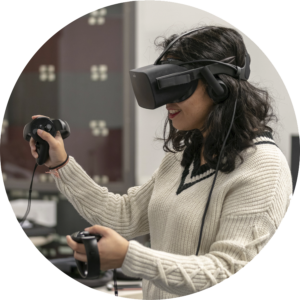
Photo by Dave Burbank.I’m a postdoctoral researcher at Caltech, where I study social media and well-being with Dr. Dean Mobbs, Dr. Ketika Garg, Dr. Ian Anderson, and Dr. Bo Zhang at the Fear Lab. Prior to joining the Fear Lab, I completed my graduate studies in Communication at Cornell University, under the mentorship of Dr. Andrea Stevenson Won of the Virtual Embodiment Lab. My research area encompasses building and evaluating therapeutic virtual environments for individuals with depression, and my dissertation focused on equitable representation with avatar-based social interactions.
Like many of my peers, my journey into Communication studies was unconventional. I wanted to understand how people perceive and make sense of their realities from multiple perspectives. As an undergraduate at Rhodes College, I majored in Neuroscience to understand brain ‘mechanics’ (how is reality represented by the brain) and minored in Chinese studies to learn how culture and meaning-making shape our perceptions. Missing my love for technology and art, I also worked as a lab assistant and eventual manager of the digital media lab, a computer and media production facility for students of Rhodes College, in the latter half of my undergraduate career. It was during this time when I learned about the field of Human Computer Interaction (HCI), which merged my interests in visual perception, meaning-making, and design, thanks to Dr. Person at the Learning Technologies Lab. This set the groundwork for a senior thesis on visual cognition under the guidance of Dr. Jason Haberman at the Visual Cognition Lab.
After Rhodes, I sought a masters in professional science (MPS), with a concentration in HCI, at Cornell University. While pursuing my masters, I worked with Dr. Schrader (PsyComm Lab) on the Everybody Talks project and completed a capstone project for the Communication and Collaborative Technologies Lab. During my masters I came up with an idea to develop an app that induces short bursts of positive emotion for a class project. Although the app never made it past the ivory tower, the experience and the idea cemented my interest in designing applications for mental health management.
Wanting the best of multiple worlds, I pursued a degree in Communication at Cornell University where I could implement various academic disciplines into my research, create virtual environments, and engage meaningfully with the mental health community. During my graduate studies I honed my skills in quantitative and qualitative methods, and developed my research area: how are online self-representations (e.g., avatars) and self-perceptions related, and what is their relationship to a person’s mental health? This set the stage for conducting more intervention-based research at Caltech, where I now study the social cognitive processes that underly negative mental health outcomes as targets for treatment.